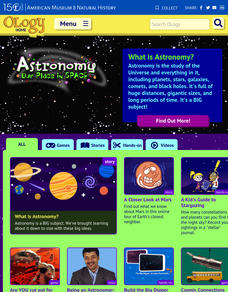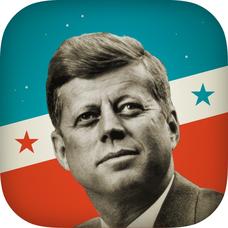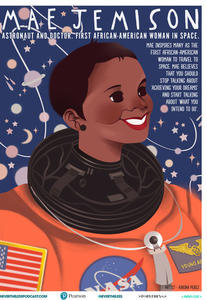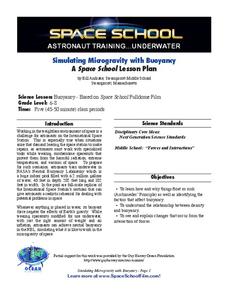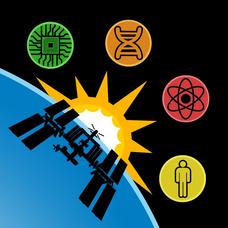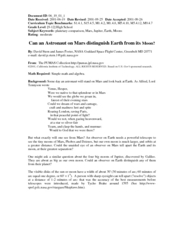American Museum of Natural History
Planetary Mysteries
A website all about planetary mysteries—it's a one-stop-shop for all things, stars, planets, and space travel. Scholars read an astronomy overview to discover the page's big ideas, then choose from the plethora of resources, including...
John F. Kennedy Library Foundation
JFK Challenge
And so, my fellow Americans: ask not what your country can do for you—ask what you can do for your country. And so begins your invigorating, innovative learning experience in the JFK Challenge app! Learners choose from two "missions" and...
Curated OER
Food for Spaceflight
When astronauts get hungry in outer space, they can't just call and have a pizza delivered. In order to gain an appreciation for the challenges associated with space travel, young learners are given the task of selecting, testing, and...
Curated OER
Get a Leg Up
Traveling through space is an amazing experience, but it definitely takes a toll on the body. After reading an article and watching a brief video, learners perform an experiment that simulates the effects of zero gravity on the human body.
Curated OER
What's Out There? Space Shuttle Exploration and Simulation
Learners simulate life in space aboard the space shuttle. In this space exploration lesson, students work in small groups to model life aboard the space shuttle. Each student is given a job, conducts Internet research on space, and...
American Institute of Physics
Meet Four Pioneering African American Astronauts
An out-of-this-world resource introduces young scientists to four African American astronauts: Michael P. Anderson, Ronald E. McNair, Guion S. Bluford Jr., and Jeanette J. Epps. Groups read biographies of these individuals and prepare...
American Museum of Natural History
Beyond Planet Earth
Scholars take a journey through space with 16 eye-catching images. Along the way, learners read captions starting with the moon, then move onto asteroids, Mars, and Jupiter.
American Museum of Natural History
Are YOU Cut Out for Mars?
A brief, 6-question quiz identifies whether or not a scholar is ready for a mission to Mars.
American Museum of Natural History
Being an Astronomer: Neil deGrasse Tyson
An interview delves deep into the life of famous astronomer Neil deGrasse Tyson.
DocsTeach
Analyzing a Photograph of Sally Ride
Sometimes, a picture really does say it all. The activity uses a picture of astronaut Sally Ride to help elementary academics make observations and form conclusions. Young historians study the picture, complete short written prompts, and...
Las Cumbres Observatory
Astronaut Training: Dexterity
How do astronauts do anything with those gloves on? Learners mimic what astronauts need to overcome as they complete puzzles while wearing multiple gloves. They time themselves and use the information to draw conclusions about the...
A Mighty Girl
Mae C. Jemison
The poster of Mae C. Jemison, the first African-American woman astronaut, challenges young scientists to consider what they intend to do to achieve their dreams.
PBS
Latino Americans Share Their Experiences
Three Latino Americans are the focus of an interactive that spotlights their accomplishments. Scholars get to know Lin-Manuel Miranda, Judy Reyes, and José Hernández through short informative text and videos. Participants read, take...
Florida International University
Simulating Microgravity with Buoyancy
How do astronauts know how to live and work in a weightless environment? It doesn't come naturally! Junior physicists conduct experiments to examine the link between buoyancy and microgravity. Each activity illustrates a different aspect...
K5 Learning
What Is A Spacewalk?
Read about all the jobs astronauts do and all the responsibilities they have while on a spacewalk. After reading the what, the why, and the how about spacewalks, readers respond to six comprehension questions.
Teach Engineering
Manned Mission to Mars
To go or to not to go — the question for a mission to Mars. This resource provides details for a possible manned mission to Mars. Details include a launch schedule, what life would be like on the surface, and how the astronauts would...
NASA
Space Station Research Explorer
Take a trip into outer space from the safety of your classroom. A great addition to the digital library of any science teacher, this reference offers a behind-the-scenes look at the research going at the International Space Station.
BioEd Online
Muscles and Bones in Space
Being an astronaut takes not only high mental acuity, but also a high level of physical fitness, especially for those who spend a long amount of time away from Earth, such as the astronauts serving on the International Space Station....
Curated OER
Mission to Mars
Students consider the affects of space travel on the human body. In this human physiology lesson, students compare how the 5 different body systems work on Earth and in Space. Students then design a product that an astronaut could use as...
Curated OER
What Do I Wear Out Here?
First graders identify the components of a modular spacesuit. In this astronaut clothing lesson, 1st graders discuss the importance of appropriate clothing for working in space. Students define the term modular and explore an Internet...
Curated OER
Spuds in Space
Students explore the effects of velocity on an object when it collides with another object. They design and outfit a potato astronaut in a spacesuit to withstand the hazards of high velocity impacts from space debris and meteoroids.
Curated OER
Astronaut on a Space Walk
Students identify important figures in space travel and advancements made possible because of their contributions. They identify the parts of an astronaut's space suit and construct a realistic replica of an astronaut dressed for a space...
Curated OER
Can an Astronaut on Mars Distinguish Earth from its Moon?
High schoolers explore the possibility of being on Mars and being able to identify the Earth. In this space lesson plan students complete a set of calculations to see if this is possible.
Curated OER
The Science of Sleep and Daily Rhythms: Sleeping in Space
Students write about strange places that they have slept. In this sleep science lesson plan students read about astronauts sleeping experience in space. They reflect on unusual places that they have slept and write about it.


